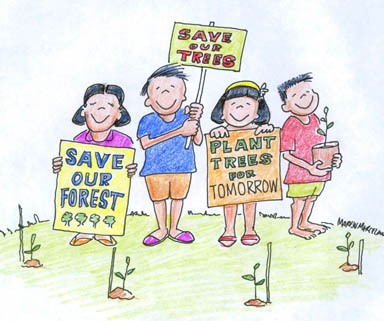ETHICAL VIRTUE GROUP
Because I value moral excellence as Christ's way, I choose to make decisions based on ethical principles.

ETHICAL VIRTUE GROUP Because I value moral excellence as Christ's way, I choose to make decisions based on ethical principles. |
|
| How To Make Good Decisions Ecology God created all nature to work together, each thing with its special task to do. The environment is precious. |
|
I choose
to practice good ecology. |
Ecology means: concern for the environment. God carefully balanced all the natural resources. Then He gave man control over it all. Sin has made some problems but we should do our best to maintain as much balance in nature as is possible.
|
|
“In our labor we are to be workers together with
God. He gives us the earth and its treasures; but we must adapt them to
our use and comfort.” ED 214
|
“Choosing Our Path”, Treasury
of Devotional Aids for Home and School. There are at lest 15 stories
about animals and plants in this book. |
|
Biology: God told Adam to care for the earth, we too should care for
our environment. Genesis 2:15
|
Treasury of Devotional Aids for Home and School by the Department of Education of the General Conference of SDA. R&H. 1951
Statement on Stewardship of the Environment
It is the belief of the Seventh-day Adventist Church that humankind was created
in the image of God, and is thus to represent God as His steward and to manage
the natural environment in a faithful and fruitful way. Nature is a gift from
God. Unfortunately, men and women have been increasingly involved in an irresponsible
destruction of the earth's resources, resulting in widespread suffering, environmental
degradation, and the threat of climate change.
While scientific research needs to continue, it is clear from the accumulated
evidence that the increasing emission of destructive gasses, the massive destruction
of the American rain forests, and the depletion of the protective mantel of
ozone (the so-called greenhouse effect), are all threatening the earth's eco-system.
There are dire predictions of global warming, rising sea levels, increasing
frequency of storms and destructive floods, and devastating desertification
and droughts.
These problems are largely due to human selfishness and greed which result in
ever increasing production, unlimited consumption, and depletion of nonrenewable
resources. Solidarity with future generations is discussed, but the pressure
of immediate interests is given priority. The ecological crisis is rooted in
humankind's greed and refusal to practice good and faithful stewardship.
The government and people of Costa Rica are to be commended for their support
of a comprehensive policy of sustainable development in harmony with nature.
Seventh-day Adventism advocates a simple, wholesome lifestyle, where people
do not step on the treadmill of unbridled over-consumption, accumulation of
goods, and production of waste. A reformation of lifestyle is called for, based
on respect for nature, restraint in the use of the world's resources, reevaluation
of one's needs, and reaffirmation of the dignity of created life.
This statement was approved and voted by the General Conference of
Seventh-day Adventists Administrative Committee (ADCOM) for release
by the Office of the President, Robert S. Folkenberg, at the Annual
Council session in San Jose, Costa Rica, October 1-10, 1996.
Primary: Middle: High school:
|